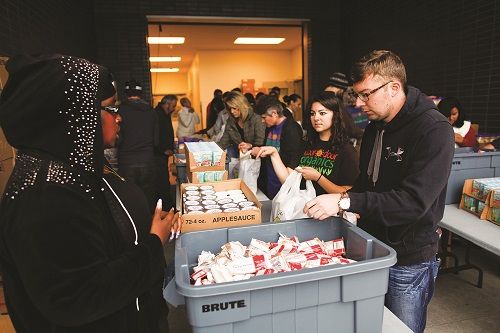Early Bird
Civic Inspirations
What is civic engagement anyway?
By Elizabeth Parmelee
February 27, 2019
 Did you know that Metropolitan State University of Denver won a national award for voter turnout in the 2016 election cycle? Have you ever tried to count the number of cool initiatives that MSU Denver faculty, staff and students engage in to benefit others? Did you wonder what Humanitarian Engineering is all about or why accounting students work to help low-income residents with their tax returns? Are you involved in something that gives back to the community or promotes active citizenship?
Did you know that Metropolitan State University of Denver won a national award for voter turnout in the 2016 election cycle? Have you ever tried to count the number of cool initiatives that MSU Denver faculty, staff and students engage in to benefit others? Did you wonder what Humanitarian Engineering is all about or why accounting students work to help low-income residents with their tax returns? Are you involved in something that gives back to the community or promotes active citizenship?
Civic engagement occurs when students are actively engaged with differing perspectives in addressing common problems that affect the well-being of communities, the nation and the world. As stated in A Crucible Moment (the National Task Force on Civic Learning and Democratic Engagement, 2012):
Today’s education for democracy needs to be informed by deep engagement with the values of liberty, equality, individual worth, openmindedness and the willingness to collaborate with people of differing views and backgrounds toward common solutions for the public good (p. 3).
When our students become engaged in courses, activities or programs that connect them to diverse communities and give them the opportunity to identify problems and find collaborative solutions, they are gaining important learning that will transfer to life and career. The outcomes are ones we can all value: responsibility, communication and persuasion, leadership, political analysis, teamwork and conflict resolution.
From its earliest history in the U.S., education has been closely tied to ensuring that we have an educated citizenry. It’s hard to argue with that logic, but civic engagement at an institution such as MSU Denver goes further and is more important. Our students are members of the community where we live. Regardless of citizenship status, we want our community members to be not only highly educated but also aware of their impact as community members, the ways in which they can promote change that serves their community and their potential as problem solvers and leaders.
Students who have taken Aaron Brown’s Humanitarian Engineering class didn’t just have a terrific study-abroad experience with hands-on practice in solving a complex problem. They also learned that engineers can affect entire communities with their work. Students volunteering with Food for Thought on Fridays, packing food sacks under the Colfax viaduct rain or shine, don’t just get a warm, fuzzy feeling knowing they have helped feed a hungry child; they have learned about the reality of hunger and have discovered that they can affect a child, a family and an entire school community. Initiatives such as these respond to the national call for universities to educate students not only for careers but for lives as active members of their communities, locally and globally.
How can you support civic engagement at MSU Denver?
- Join others in one of the various initiatives of the American Democracy Project.
- If you teach: Identify ways in which your discipline contributes to solving community issues and share those with students. Challenge them to think of creative solutions to issues that concern them.
- Explore the possibility of incorporating Service Learning into a course you teach.
- Beyond the classroom, ask students you work with how they engage with their community and connect them to others with similar interests.
- Encourage students and colleagues to participate in Roadrunners Give Back Day – coming up April 11 … and don’t forget to volunteer yourself!
